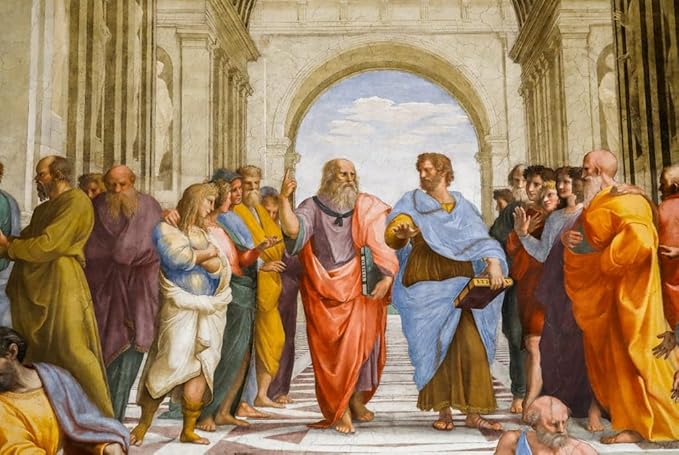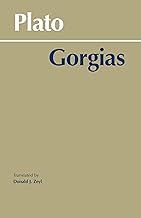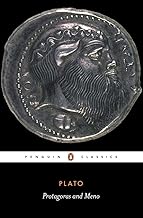
How to Read Plato's Books on Ethics
How to Read Plato's Books on Ethics
Estimated Reading Time: 4-6 minutes
Introduction
Plato, one of the most influential philosophers in Western thought, was born around 427 BCE in Athens, a city steeped in rich philosophical tradition. His works have shaped our understanding of ethics, politics, and metaphysics, making him a cornerstone of philosophical inquiry. Plato's exploration of ethics is particularly significant as it delves into the nature of justice, virtue, and the ideal society—concepts that remain relevant today.
Plato's perspective on ethics is unique because it combines philosophical rigor with a deep concern for the moral development of individuals and society. His dialogues often feature Socratic questioning, which encourages readers to reflect critically on their beliefs and assumptions. The historical context of Plato's work—emerging from the tumultuous political landscape of Athens—adds layers of complexity to his ethical theories, making them not only philosophical treatises but also practical guides for living a virtuous life.
Why Plato's Perspective Matters
Plato's approach to ethics is distinctive for several reasons. Firstly, he emphasizes the importance of the ideal forms, particularly the Form of the Good, which serves as the ultimate standard for ethical behavior. Unlike many of his contemporaries, who focused on subjective notions of right and wrong, Plato sought objective truths about morality.
Moreover, his dialogues often reveal the tension between rhetoric and philosophy, particularly in the context of ethics. This exploration of moral relativism versus moral absolutism remains pertinent in contemporary discussions about ethics. Plato's ideas have profoundly influenced subsequent thinkers, from Aristotle to modern philosophers, establishing a foundation for Western ethical thought.
Overview of Recommended Books
The Republic
Main Themes and Arguments: "The Republic" is perhaps Plato's most famous work, presenting a vision of a just society and the role of the philosopher-king. Central to the dialogue is the question of what justice is and how it can be achieved. Plato uses the allegory of the cave to illustrate the difference between the world of appearances and the world of forms, emphasizing the need for philosophical enlightenment to understand true justice.
Historical Context and Significance: Written during a time of political instability in Athens, "The Republic" reflects Plato's concerns about democracy and the potential for mob rule. His advocacy for a society governed by philosopher-kings offers a radical alternative to the prevailing political systems of his time.
Key Insights and Takeaways:
- Justice as Harmony: Plato argues that justice is achieved when each class in society performs its appropriate role, creating harmony.
- The Allegory of the Cave: This metaphor illustrates the transformative journey from ignorance to knowledge, emphasizing the philosopher's role in society.
- Education and Virtue: Plato underscores the importance of education in cultivating virtue and preparing individuals for leadership.
Why Read This Book: "The Republic" is essential for understanding the foundations of ethical thought and the relationship between individual morality and societal justice. It is particularly beneficial for students of philosophy, political science, and anyone interested in the moral implications of governance.
Gorgias
Main Themes and Arguments: In "Gorgias," Plato engages with the nature of rhetoric and its ethical implications. Through a dialogue between Socrates and several sophists, Plato critiques the use of persuasive speech as a means of manipulation rather than truth-seeking. He argues that true rhetoric should serve the pursuit of justice and the good.
Historical Context and Significance: The work reflects the rise of sophistry in Athens, where rhetoric was often used to sway public opinion rather than promote genuine understanding. Plato's critique of sophistry highlights the ethical responsibilities of those who wield language and persuasion.
Key Insights and Takeaways:
- The Distinction Between True and False Rhetoric: Plato emphasizes that rhetoric should aim to promote truth and justice, not merely to win arguments.
- The Nature of the Good Life: Socrates argues that a life devoted to virtue is superior to one focused on pleasure or power.
- The Consequences of Unethical Persuasion: The dialogue illustrates how unethical rhetoric can lead to societal harm and individual corruption.
Why Read This Book: "Gorgias" is crucial for understanding the ethical dimensions of communication and persuasion. It is particularly relevant for students of rhetoric, communication, and ethics, as it challenges readers to consider the moral implications of their words and actions.
Protagoras
Main Themes and Arguments: In "Protagoras," Plato explores the nature of virtue and whether it can be taught. The dialogue features a discussion between Socrates and the sophist Protagoras, who argues that virtue is a form of knowledge that can be imparted. Socrates counters this view, suggesting that virtue is inherently linked to knowledge and wisdom.
Historical Context and Significance: This work reflects the intellectual debates of Plato's time, particularly the tension between sophists, who claimed to teach virtue for a fee, and philosophers like Socrates, who sought deeper truths about morality.
Key Insights and Takeaways:
- Virtue as Knowledge: Plato posits that true virtue arises from knowledge and understanding, challenging the notion that it can be taught through mere instruction.
- The Unity of Virtue: Socrates argues that all virtues are interconnected, suggesting that one cannot possess a single virtue without embodying them all.
- The Role of Self-Examination: The dialogue encourages readers to engage in self-reflection to cultivate their own understanding of virtue.
Why Read This Book: "Protagoras" is essential for those interested in the nature of virtue and the philosophical inquiry into ethical education. It is particularly valuable for educators, students, and anyone seeking to understand the complexities of moral development.
How These Books Complement Each Other
Together, these works provide a comprehensive exploration of ethics from different angles. "The Republic" offers a vision of a just society, while "Gorgias" critiques the ethical implications of rhetoric, and "Protagoras" investigates the nature of virtue and its teachability. Reading them in conjunction allows for a deeper understanding of how individual ethics relate to societal structures and the importance of philosophical inquiry in moral development.
Who Would Benefit from Reading These Books
These texts are ideal for a variety of readers:
- Students and Academics: Those studying philosophy, political science, or ethics will find rich material for analysis and discussion.
- General Readers Interested in Ethics: Anyone curious about moral philosophy will benefit from the accessible yet profound insights offered by Plato.
- Professionals Seeking Practical Wisdom: Individuals in leadership or communication roles can gain valuable perspectives on ethics and persuasion.
- Anyone Looking for Personal Growth: Readers interested in self-improvement will find guidance in Plato's exploration of virtue and the good life.
Recommended Reading Order
- Start with: The Republic - This foundational text sets the stage for understanding Plato's ethical framework and the relationship between justice and society.
- Continue with: Gorgias - This dialogue expands on the ethical implications of rhetoric, encouraging readers to reflect on the power of language and persuasion.
- Advanced reading: Protagoras - This work deepens the exploration of virtue, challenging readers to consider the complexities of moral education and self-examination.
Tips for Getting the Most Out of Each Book:
- Take notes on key arguments and themes as you read.
- Engage with the dialogues by asking questions and considering counterarguments.
- Discuss the texts with others to enrich your understanding and perspective.
Conclusion
Plato's contributions to ethics remain profoundly relevant today, offering timeless insights into justice, virtue, and the moral responsibilities of individuals and society. His works encourage readers to engage in deep philosophical inquiry and self-reflection, fostering personal growth and ethical understanding. I encourage you to explore these texts, as they provide not only a foundation for ethical thought but also a guide for living a virtuous life in an ever-complex world.
Tags: #Plato #Ethics #Philosophy #ReadingGuide #ClassicLiterature #Wisdom
Featured Books

The Republic
by Plato
Published: 380 BC
Packaged in handsome, affordable trade editions, Clydesdale Classics is a new series of essential works. From the musings of intellectuals such as Thomas Paine in Common Sense to the striking personal narrative of Harriet Jacobs in Incidents in the Life of a Slave Girl, this new series is a comprehensive collection of our intellectual history through the words of the exceptional few.Originating in approximately 380 BC, Republic is a Socratic dialogue written by famed Greek philosopher Plato. Often referred to as Plato’s masterwork, Republic’s central goal is to define the ideal state. By conceptualizing this model state, Greeks believed it would lead states formed with its principles in mind to function the most efficiently and fairly, striving toward justice and the greater good of society.This edition includes a foreword by British American philosopher and Plato expert Simon Blackburn. Widely read around the world by philosophy students and academics alike, Plato’s Republic is sure to pass on its invaluable lessons and enlighten the next generation of thinkers. Read more

Gorgias
by Plato
Published: 380 BC
This is an excellent translation. It achieves a very high standard of accuracy and readability, two goals very difficult to attain in combination when it comes to such a master of prose and philosophical argument as Plato. Because of this the book is suitable for courses at all levels in philosophy, from introductory courses on Plato, or problems in Philosophy, to graduate seminars. --Gerasimos Santas, Teaching Philosophy Read more

Protagoras
by Plato
Published: 380 BC
Two of Plato's finest dialogues; together they offer a rich and entertaining exploration of the origins of right and wrong, hedonism, self-control, the teachability of goodness, and the sources of our knowledge.Exploring the question of what exactly makes good people good, Protagoras and Meno are two of the most enjoyable and accessible of all of Plato's dialogues. Widely regarded as his finest dramatic work, the Protagoras, set during the golden age of Pericles, pits a youthful Socrates against the revered sophist Protagoras, whose brilliance and humanity make him one the most interesting and likeable of Socrates' philosophical opponents, and turns their encounter into a genuine and lively battle of minds. The Meno sees an older but ever ironic Socrates humbling a proud young aristocrat as they search for a clear understanding of what it is to be a good man, and setting out the startling idea that all human learning may be the recovery of knowledge already possessed by our immortal souls.For more than seventy years, Penguin has been the leading publisher of classic literature in the English-speaking world. With more than 1,700 titles, Penguin Classics represents a global bookshelf of the best works throughout history and across genres and disciplines. Readers trust the series to provide authoritative texts enhanced by introductions and notes by distinguished scholars and contemporary authors, as well as up-to-date translations by award-winning translators. Read more